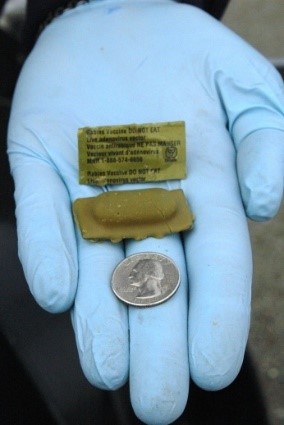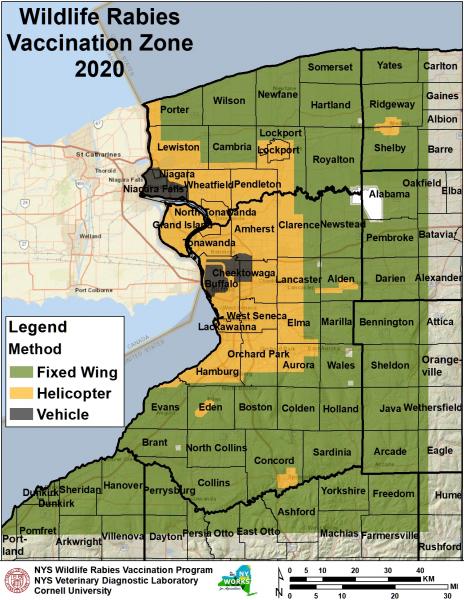Modified: August 9, 2020 12:09pm
Latest News
RABIES VACCINE AIRDROP PLANNED FOR ERIE COUNTY
Oral rabies bait protects public health by preventing deadly virus in wildlife
ERIE COUNTY, NY— In coordination with Cornell University’s Animal Health Diagnostic Center, the New York State Department of Health and the U.S. Department of Agriculture’s Animal and Plant Health Inspection Service Wildlife Services, the Erie County Department of Health (ECDOH) will participate in a wildlife vaccination program for rabies using airdrops to deliver vaccinated bait beginning the week of August 10.
More than 628,000 rabies vaccine baits will be delivered in Western New York through this program for rabies control.
Five fixed-wing aircraft will distribute bait to rural areas, weather permitting, between August 11 and August 15. Helicopters are used to distribute bait in suburban towns and villages and in open areas of the city of Buffalo from August 16-23. This schedule is weather dependent. In densely populated urban areas, ECDOH Division of Environmental Health Rabies Disease and Vector Control staff will distribute baits by hand in the city of Buffalo, Amherst and Cheektowaga from August 16-30.
The ORV program starts in the New England States and gradually progresses southward to Alabama. When poor operating conditions (e.g., rain, ground fog) prevent flights because ground visibility is obscured, the ORV schedule will be delayed accordingly.
“This bait program is part of a national strategy to eliminate rabies and we are glad to support it here in Western New York,” said Erie County Commissioner of Health Dr. Gale Burstein. “Raccoons, foxes and skunks consume this vaccine through bait and it can prevent them from developing this fatal disease and from transmitting it to other wild animals and to pets.”
“Our normal schedule of free rabies vaccination clinics has been disrupted this year,” said Senior Public Health Sanitarian Peter Tripi. “While we work to get more clinics scheduled, this is a good reminder to make sure your dogs, cats and ferrets stay on schedule with their rabies vaccination.”
“August is also the time of year when we tend to receive the most reports about bat encounters, due to weather and the bat lifecycle,” continued Tripi. “Bats are always presumed to be rabid, so if you find one in your home, trap it or contain it, and call our department for advice. We may arrange for it to be tested for rabies in order to keep you, your family and your pets safe.”

Image of bait packet with quarter coin to indicate size; provided by the United States Department of Agriculture (USDA).
Do NOT disturb baits. Most baits are eaten within four days; almost all baits will be gone within a week. If baits are not found and eaten, they will harmlessly dissolve and exposed vaccine will become inactivated. If you must move bait, wear gloves or use a plastic bag or paper towel to pick it up. Place any damaged baits in the trash; throw intact baits into a wooded area or other raccoon/wildlife habitat.
Residents should WASH HANDS IMMEDIATELY if they come into direct contact with the vaccine or bait, then call the New York State Department of Health Rabies Information Line at 1-888-574-6656.
Additional recommendations include:
- Supervise children’s outdoor activities during bait distribution and for one week afterward.
- Confine dogs and cats indoors and observe leash laws during the bait distribution interval and for one week afterward.
- This will increase the probability of raccoon vaccination and decrease the chance of pets finding the baits.
- Baits and vaccines are not harmful to domestic animals. However, an animal may vomit if it consumes several baits.
Residents should not risk being bitten while trying to remove bait from your pet’s mouth.
Image of Wildlife Rabies Vaccination Zone 2020:

#
ECDOH, Rabies Information: https://www2.erie.gov/health/index.php?q=rabies-information
ECDOH, Environmental Health: 716-961-6800 (For Emergencies after regular business hours: 716-961-7898)

